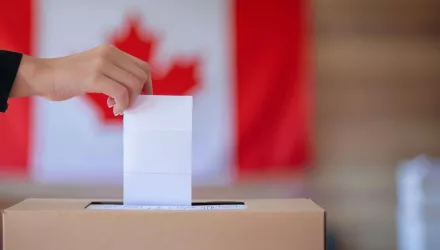Memo in report Confrontation or Collaboration? Congress and the Intelligence Community
This originally apeared as an Issue Memo (pp. 92-95) in the report Confrontation or Collaboration? Congress and the Intelligence Community, a publication of The Intelligence and Policy Project of Harvard Kennedy School's Belfer Center for Science and International Affairs.
The "Uniting and Strengthening America by Providing Appropriate Tools Required to Intercept and Obstruct Terrorism Act of 2001," also known as the USA-PATRIOT Act, was passed a month after September 11, 2001 in order to give U.S. officials new legal tools to detect and thwart future terrorist attacks. Although it originally passed with very little opposition, votes to reauthorize the Act prompted significant debate about several provisions. In 2009, Congress will once again examine certain sections of the USA-PATRIOT Act.
This memo provides an overview of the USA-PATRIOT Act and its provisions that will expire at the end of 2009.
Overview
Major provisions of the 2001 USA-PATRIOT Act included:
- Enhanced surveillance procedures for law enforcement, including amendments to the Foreign Intelligence Surveillance Act (FISA). Specifically, the Patriot Act gave federal officials new surveillance authority in terrorism cases, as well as the ability to conduct searches of property without the consent or knowledge of the owner or occupant.
- Increased federal authority to freeze financial assets of suspected terror groups and individuals.
- Measures enhancing border security, restricting suspected terrorist ability to obtain visas, and detaining suspected terrorists within the U.S.
- New criminal statutes broadening the category of terrorism-related offenses. In particular, the Act made it illegal to provide "material support" for terrorist activities.
Amendments to the PATRIOT Act Set to Sunset in 2009
The Act and subsequent reauthorizations included a number of temporary provisions that expanded federal authority to undertake surveillance in terrorism cases. Two provisions—one authorizing federal officials to use "roving" wiretaps and another giving federal officials the power to compel third parties to divulge business records—are set to expire at the end of 2009.
- Another controversial provision, dedicated to thwarting the so-called "lone wolf" terrorist, was part of the 2004 Intelligence Reform and Terrorism Prevention Act (IRTPA). This provision will also sunset in 2009.
The "Roving" Surveillance Provision
Section 206 of the PATRIOT Act allows investigators to track individuals with the same FISA warrant even if the suspect frequently changes his communication devices. Federal officers can now use the same warrant instead of obtaining a separate warrant for each phone, email address, apartment, or other facility used by the suspect.
- This authority was used 49 times between October 2001 and March 2005.
- The use of roving warrants is reported to Congress on a semiannual basis, and each specific order is reviewed by the Foreign Intelligence Surveillance Court (FISC).
In order to obtain a roving warrant, the federal agency must provide:
- A specific description of the target and the facilities or places the agency wants to monitor.
- Probable cause that the target is a foreign power (such as a foreign spy) or an agent of a foreign power, including members of a foreign terrorist organization.
- Information that indicates roving surveillance is necessary because the target might otherwise thwart normal surveillance procedures.
This provision addressed the likelihood that terror suspects change communication methods in order to evade detection.
- Without this 'roving' surveillance, investigators would have return to the FISC for every new phone that the suspect might use, allowing the suspect to evade detection.
- Similar roving surveillance had been successfully used by law enforcement in drug and racketeering investigations.
The 'Business and Other Tangible Records' Provision
Section 215 of the Act revised the rules governing federal officials ability to acquire business and other tangible records. 'Tangible records' include: business records, phone provider records, apartment rental records, driver's license records, library records, book sale records, gun sale records, tax return records, educational records, and medical records.
- Under this provision, federal investigators can compel third-party record holders, such as telecom firms, banks or others, to disclose these documents.
- Between October 2001 and March 2005, this provision was used 35 times to obtain credit card information, apartment leasing records, and telephone subscriber information on various individuals.
In order to use this provision, the U.S. must show that there are reasonable grounds to believe that the records are relevant to an international terrorism or counterintelligence investigation.
- The FBI Director or the FBI Deputy Director must personally approve applications for orders involving library, book sales, firearms, tax, educational or medical records.
- Recipients of an order can consult with legal counsel and challenge the order.
- The use of these orders must be reported to Congress on an annual basis.
Section 215's supporters suggest the orders are similar to grand jury subpoenas, but carry even more safeguards since they are approved by the FISA court.
- The "relevancy" standard for the records, along with heightened protections for library, book sales, gun sales, and medical records, protects privacy and First Amendment rights.
Critics of Section 215 argue that the "relevancy" standard can be used to obtain almost anything and that Congress should require a higher standard for law enforcement. Some believe heightened protections for library and other records may not be strict enough to protect privacy and First Amendment rights.
- Furthermore, some believe federal officials should not be allowed to obtain gun sales and library records in the first place.
The "Lone Wolf" FISA Provision
Section 6001 of IRTPA broadened FISA's scope by allowing surveillance of any non-U.S. person who engages or prepares to engage in international terrorism. A "lone wolf" refers to an individual who commits terrorist acts but lacks an explicit connection to a foreign power or a terrorist organization.
- Ordinarily, FISA allows surveillance only if the target is a foreign power—for instance, a country or a terrorist group—or an agent of a foreign power. Thus, in order to conduct surveillance of a "lone wolf," investigators would be obliged to show that the suspect meets the definition and all other FISA requirements.
- While not part of the original USA-PATRIOT Act, the 2006 Patriot Act mandated the "lone wolf" amendment to expire at the same time as Sections 206 and 215; hence, U.S. lawmakers will probably debate these provisions at the same time.
The "lone wolf" amendment may close a critical gap in FISA law by ensuring that all individuals engaged in terrorist activity can be targeted.
- Investigators would be able to target international terrorists irrespective of whether a wider network has been identified.
- Moreover, by requiring probable cause to indicate the target is engaging or preparing to engage in a terrorist act, supporters argue that the "lone wolf" amendment has sufficient safeguards to prevent targeting unrelated persons.
On the other hand, by eliminating the requirement of some connection to a foreign power or an agent of a foreign power, the "lone wolf" provision may allow federal authorities to cast a wide net over many people, including individuals with little connection to terrorism.
Sources
Abramson, Larry and Maria Godoy. "The Patriot Act: Key Controversies." NPR. 14 February 2006.
"Bush Officials Urge Congress to Boost Patriot Act Powers." Washington Times. 6 April 2005.
"H.R.3162: Uniting and Strengthening America by Providing Appropriate Tools Required to Intercept and Obstruct Terrorism (USA PATRIOT ACT) Act of 2001 (Enrolled as Agreed to or Passed by Both House and Senate)" Library of Congress. http://thomas.loc.gov/cgi-bin/query/z?c107:H.R.3162.ENR:.
Lichtblau, Eric. "A Nation At War: Liberty And Security; Republicans Want Terrorism Law Made Permanent." New York Times. 9 April 2003.
Schmitt, Richard. "Patriot Act is called vital." Los Angeles Times. 6 April 2005.
"USA PATRIOT Act Additional Reauthorizing Amendments Act of 2006 (S. 2271)" Congressional Research Service, 21 February 2006.
Read and download the full report:
Confrontation or Collaboration? Congress and the Intelligence Community
Download this memo:
Rosenbach, Eric and Aki Peritz. "The USA-PATRIOT Act." Memorandum, "Confrontation or Collaboration? Congress and the Intelligence Community," Belfer Center for Science and International Affairs, Harvard Kennedy School, July 2009.







